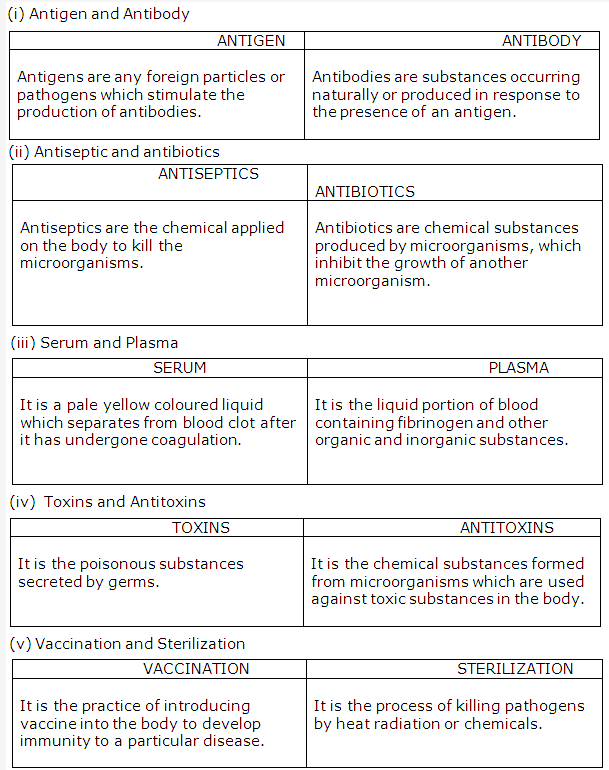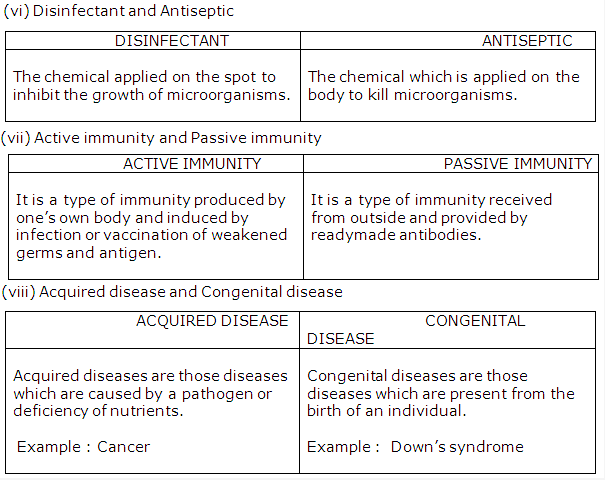Frank ICSE Class 10 Biology Solutions – Health
PAGE NO : 162
Solution 1:
- Disease: Any physical or physiological disorder in normal functioning of any organ or part of body is called disease.
- Health: Health is a state of complete mental, physical and social well being.
- Vaccinations: It is the practice of introducing vaccine (weakend or killed germs) into the body to develop immunity to a particular disease.
- Immunity: It is the ability of the body to resist microorganisms that enter the body and thus prevent diseases.
- Antiseptic: Antiseptics are chemicals applied on the body to prevent the growth of microorganisms.
- Cancer: Cancer is the uncontrolled growth of abnormal cells in the body.
- Allergy: Allergy is a hypersensitive state acquired through exposure to a particular allergen such as drugs, pollens or microorganisms.
- Hypersensitivity: It refers to undesirable and excessive reactions in response to an allergen produced by the normal immune system.
- Immunization: It is the process by which the body is protected against disease by inoculating the person with vaccine.
- Disinfectant: Disinfectants are chemicals applied on the spots to prevent the growth of microorganisms.
- Penicillin: It is an antibiotic which was discovered firstly from a fungus , Penicillium notatum.
- Sulphonamide drugs: Sulphonamide drugs are a group of synthetic drugs which prevent the growth and multiplication of bacteria. They are commonly called as sulpha drugs.
- Acquired disease: Acquired diseases are those diseases which are caused by a pathogen or deficiency diseases.
- Prophylaxis: A prophylaxis is a measure taken to maintain health and prevent the spread of disease.
- Antibiotic: Antibiotics are the chemical substances formed from microorganisms which kill or prevent the growth of disease causing microbes.
Solution 2:


Solution 3:
Artificial Respiration: It is a method of first-aid used to restore or maintain respiration in a person who has stopped breathing. The method uses mechanical or manual means to force air into and out of the lungs in a rhythmic fashion.
Solution 4:
DPT: Diphtheria, Pertussis and Tetanus.
Solution 5:
Antigens, that cannot stimulate the immune system of the body of a person, are called haptene.
Solution 6:
The three germ killing secretions of our body are:
- Mucus secretions from windpipe
- Hydrochloric secretions from stomach
- Tears from eyes.
Solution 7:
BCG stands for: Bacillus Calmette Guerin.
Solution 8:
- Antiseptic: Antiseptic are mild chemical applied on the body to kill the microorganisms. Example: Halogens (I)
- Antibiotic: Antibiotic is a natural chemical substance produced by a microorganism, which inhibits or kills another microorganism. Example: Penicillin
Solution 9:
- Passive acquired immunity
- Antiseptics
Solution 10:
antibiotic
Solution 11:
Antiseptics are the chemical substances applied on the body to destroy or prevent the growth of microbes. It is harmless to skin and body. For example Alcohols, halogens can be used as antiseptic on skin.
Solution 12:
The two international health organisations are: WHO and Red Cross.
PAGE NO : 163
Solution 13:
Vaccination: It is the practice of artificially introducing the germs or the germ substances into the body for developing resistance to particular disease.
Solution 14:
- Disinfectants: Disinfectants are chemicals applied on the spots to prevent the growth of microorganisms. It is a strong germ-killing substance. But it may cause harm to skin and body. Example: Lysol, DDT etc.
- Penicillin: Penicillin is the first antibiotic discovered by Alexander Fleming. It is obtained from Penicillium notatum. It has a very high therapeutic value and used against a number of gram positive bacteria including those causing Rheumatic fever , pneumonia , sore throat etc.
- Sulphonamides: Sulphonamides popularly called sulpha drugs are a group of synthetic drugs which possess bacteriostatic property because they are able to block the enzyme system of bacteria.
- Vaccines: Vaccine is a preparation consisting of dead or weakend microbes which help to build immunity in the human body .When introduced in an individual, a vaccine stimulates the production of antibodies against the particular type of germs.
Solution 15:
- proteins that react with antigens or invading germs
- antigen
- Penicillin, rheumatic fever
Solution 16:
- True
- False
- True
- True
- False
- True
- False
- True
Solution 17:
- (a) Plasma Protein
- (b) destroy micro-organisms
- (a) I
- (c) Jenner
- (c) Tuberculosis
- (d) 1985
- (b) eradicating Polio by 2000.
- (c) diphtheria
- (b) virus
- (c) Small Pox
